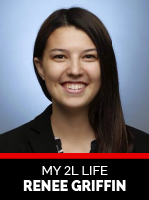My 2L Life: The 'Weirdness' of Law School's Second Year
One month into my second year of law school, I've been struggling to find the proper way to describe 2L. In a word: weird.
October 02, 2019 at 05:11 PM
5 minute read
 Image: Shutterstock
Image: Shutterstock
The first year at Michigan Law School was fairly simple to describe, though not simple to complete: You do your reading, you go to class, you panic occasionally, you take high-stakes exams, you get your grades.
Now, one month into my second year of law school, I've been struggling to find the proper words to describe 2L without resorting to already well-known adages (first year they scare you to death, second year they work you to death, etc.).
 The best I've got is that 2L is weird.
The best I've got is that 2L is weird.
The weirdness began—maybe peaked, frankly—even before first day of classes. Droves of recruiting attorneys descended on Ann Arbor (and many other law school campuses) at the end of July to conduct the first round of interviews for 2020 summer associate positions at Big Law firms nationwide. This routine has become standard operating procedure in the legal profession, but my efforts to explain the process to non-law school friends remind me that it's not exactly normal.
At Michigan, these screener interviews were held in the "Lawyers' Club," which is the dormitory next to the law school where many first-year law students live. While the beds had (mercifully) been moved out of the rooms, the setting was still strange. During one of my interviews, a pedal trolley manned by frat boys drinking beer trundled slowly along the street just outside the window, directly over the shoulder of the interviewer. I managed to repress my amusement and continued talking, which was fortunate because that law firm ended up hiring me.
Another oddity: As the clock ticked toward the end of each 20-minute interview, we interviewees would fill the narrow hallways of the Lawyers' Club, standing dutifully outside the door of our assigned room and sweating through our suits. In order to stick to the strict schedule, we had to knock on the door of the interview room as soon as our interview time rolled around, thereby ensuring each interviewee was given their promised 20 minutes to shine. The resulting chorus of simultaneous, disembodied knocks on every door in the building is a memory that will haunt me forever.
Those cinematic moments of OCI aside, returning to the classroom as a 2L felt weird not because it was foreign or new, but rather because it was remarkably the same. After spending the summer passably convincing myself that I could handle legal work (with tons of guidance from the lawyers around me, of course), it was startling to be in the same rooms where I sat as a terrified 1L.
This feeling was exacerbated by the fact that my 1L knowledge of the Model Penal Code and negligence and promissory estoppel did not prove useful at any point during my summer work. In theory, I understand the important foundation that doctrinal courses provide, but the theoretical big picture is not what comes to mind when my alarm goes off on Monday mornings.
Granted, 2L does offer much more variety than 1L did. My Evidence and Legislation and Regulation courses involve coursework similar to 1L doctrinal classes, but those subjects are of my own choosing and seem more likely to apply to the litigation work I want to pursue. I'm also taking an Entertainment Law course and an Alternative Dispute Resolution practice simulation that differ markedly from my 1L course load, both in terms of subject matter and structure.
Additionally, 2Ls are freed from the 1L division of students into sections, which had meant that we saw the same faces and heard the same voices every day, in every class. I had nothing against any of my classmates; I just agitated at the monotony of it.
Beyond class work, the second year of law school also brings an entirely new challenge: journals. My cite-checking and Note-writing responsibilities as an associate editor on the Michigan Law Review add quite a bit of work to my week. Fortunately, the wiring in my brain is just faulty enough that I don't hate my journal tasks. I might go so far as to say that Thursday nights with the Bluebook and an NFL game on in the background are the closest approximation of peacefulness that I've found in law school work.
If nothing else, cite-checking and academic writing, along with the more varied set of courses, represent a refreshing change from the cycle of dense cases and exam anxiety that largely defined 1L year.
Renee Griffin is a second-year student at University of Michigan Law School.
 Have you joined our group ALM Young Professionals Network on LinkedIn? We're having powerful conversations that tackle the challenges we all face early in our careers. Request to join here.
Have you joined our group ALM Young Professionals Network on LinkedIn? We're having powerful conversations that tackle the challenges we all face early in our careers. Request to join here.
This content has been archived. It is available through our partners, LexisNexis® and Bloomberg Law.
To view this content, please continue to their sites.
Not a Lexis Subscriber?
Subscribe Now
Not a Bloomberg Law Subscriber?
Subscribe Now
NOT FOR REPRINT
© 2025 ALM Global, LLC, All Rights Reserved. Request academic re-use from www.copyright.com. All other uses, submit a request to [email protected]. For more information visit Asset & Logo Licensing.
You Might Like
View All
'If the Job Is Better, You Get Better': Chief District Judge Discusses Overcoming Negative Perceptions During Q&A

The Growing Antitrust Scrutiny of DraftKings and FanDuel

What Qualities Will Distinguish Good from Great Service In 2025?

Trending Stories
Who Got The Work
J. Brugh Lower of Gibbons has entered an appearance for industrial equipment supplier Devco Corporation in a pending trademark infringement lawsuit. The suit, accusing the defendant of selling knock-off Graco products, was filed Dec. 18 in New Jersey District Court by Rivkin Radler on behalf of Graco Inc. and Graco Minnesota. The case, assigned to U.S. District Judge Zahid N. Quraishi, is 3:24-cv-11294, Graco Inc. et al v. Devco Corporation.
Who Got The Work
Rebecca Maller-Stein and Kent A. Yalowitz of Arnold & Porter Kaye Scholer have entered their appearances for Hanaco Venture Capital and its executives, Lior Prosor and David Frankel, in a pending securities lawsuit. The action, filed on Dec. 24 in New York Southern District Court by Zell, Aron & Co. on behalf of Goldeneye Advisors, accuses the defendants of negligently and fraudulently managing the plaintiff's $1 million investment. The case, assigned to U.S. District Judge Vernon S. Broderick, is 1:24-cv-09918, Goldeneye Advisors, LLC v. Hanaco Venture Capital, Ltd. et al.
Who Got The Work
Attorneys from A&O Shearman has stepped in as defense counsel for Toronto-Dominion Bank and other defendants in a pending securities class action. The suit, filed Dec. 11 in New York Southern District Court by Bleichmar Fonti & Auld, accuses the defendants of concealing the bank's 'pervasive' deficiencies in regards to its compliance with the Bank Secrecy Act and the quality of its anti-money laundering controls. The case, assigned to U.S. District Judge Arun Subramanian, is 1:24-cv-09445, Gonzalez v. The Toronto-Dominion Bank et al.
Who Got The Work
Crown Castle International, a Pennsylvania company providing shared communications infrastructure, has turned to Luke D. Wolf of Gordon Rees Scully Mansukhani to fend off a pending breach-of-contract lawsuit. The court action, filed Nov. 25 in Michigan Eastern District Court by Hooper Hathaway PC on behalf of The Town Residences LLC, accuses Crown Castle of failing to transfer approximately $30,000 in utility payments from T-Mobile in breach of a roof-top lease and assignment agreement. The case, assigned to U.S. District Judge Susan K. Declercq, is 2:24-cv-13131, The Town Residences LLC v. T-Mobile US, Inc. et al.
Who Got The Work
Wilfred P. Coronato and Daniel M. Schwartz of McCarter & English have stepped in as defense counsel to Electrolux Home Products Inc. in a pending product liability lawsuit. The court action, filed Nov. 26 in New York Eastern District Court by Poulos Lopiccolo PC and Nagel Rice LLP on behalf of David Stern, alleges that the defendant's refrigerators’ drawers and shelving repeatedly break and fall apart within months after purchase. The case, assigned to U.S. District Judge Joan M. Azrack, is 2:24-cv-08204, Stern v. Electrolux Home Products, Inc.
Featured Firms
Law Offices of Gary Martin Hays & Associates, P.C.
(470) 294-1674
Law Offices of Mark E. Salomone
(857) 444-6468
Smith & Hassler
(713) 739-1250








